Nadina LaSpina
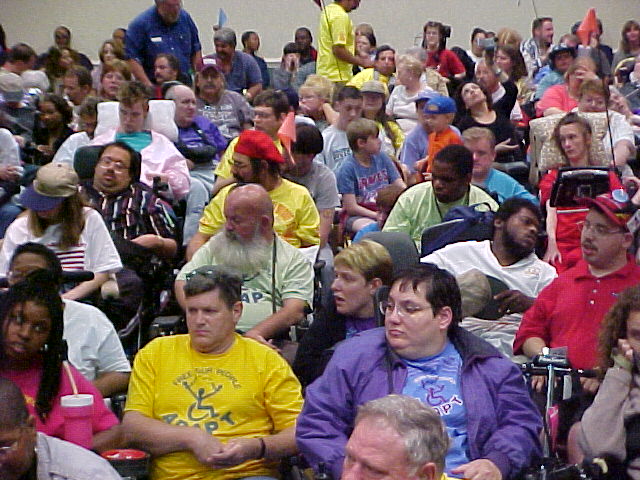 “How
do you spell POWER?” “A-D-A-P-T!!!
“How
do you spell POWER?” “A-D-A-P-T!!!
The
hotel meeting room is packed way beyond capacity. My quickie is sandwiched
between a power chair and a scooter, the wheels of another manual chair
are pressing against my footrests. In the power chair is Marva from Detroit,
on the scooter is Barbara from Memphis. I don’t know the young man in the
manual chair, this must be his first ADAPT action. I spot Frank Lozano
being guided through the wall-to-wall maze of wheelchairs. “Uncle Frank!”
I yell out to him. “How are you? Nadina here!” His head turns in the direction
of my voice: “Hey! How are things in the big apple?” I love Frank’s tex-mex
drawl. He’s from El Paso. Now I feel the sleeve of my ADAPT T-shirt being
pulled from behind me. I turn around and see my friend Sharon from Kansas
City. “Hope we’ll be on the same team,” she says. “Yeah!” I heartily agree.
There
are about 500 of us in this DC Holiday Inn. We came from all over the country,
some in groups, subsidized by local organizations or independent living
centers, some on our own with money saved month after month. 30 or 40 people
didn’t quite make it into the meeting room. They lingered a little too
long in the halls hugging each other and trying to catch up on what’s been
happening in each others’ lives in the six months since the last action.
Or they just had to stop on their way to the meeting at one of the tables
lining the hallways to buy another T-shirt or a pair of handcuff earrings
or a key-chain with the ADAPT logo. Many local groups sell their ADAPT-ware
at national actions to help pay for their members’ plane tickets and hotel
rooms. The colorful tables give the otherwise sober hotel halls a festival-like
atmosphere. Now, those who lingered in the halls are lined up, four and
five rows deep, at the two doors, trying to make up for their tardiness
by yelling A-D-A-P-T louder than those inside the room.
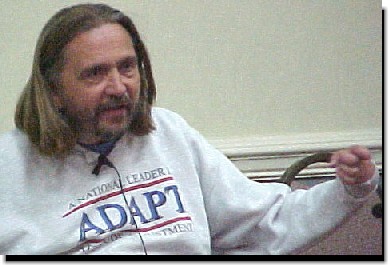 I
swear they must hear us throughout this entire hotel. But Mike Auberger,
one of our national leaders, from Denver, CO, doesn’t think we’re loud
enough. He’s trying to look tough in his power chair in the front of the
room. In their chairs alongside him, Bob Kafka and Stephanie Thomas, husband
and wife team, from Austin, TX, are smiling. “Gotta do better than that!”
Mike yells, “Let’s try again. How do you spell POWER?”
I
swear they must hear us throughout this entire hotel. But Mike Auberger,
one of our national leaders, from Denver, CO, doesn’t think we’re loud
enough. He’s trying to look tough in his power chair in the front of the
room. In their chairs alongside him, Bob Kafka and Stephanie Thomas, husband
and wife team, from Austin, TX, are smiling. “Gotta do better than that!”
Mike yells, “Let’s try again. How do you spell POWER?”
At
the top of our lungs or in a tracheotomy-whisper, with slurred vowels and
spastic arms flailing, in the mechanical voice of a communication device,
or forcefully fingerspelling with eloquent hands we all --in anyway we
can-- spell A-D-A-P-T!!!
The
excitement is mounting. This is the big meeting that marks the start of
the real action. All day we’ve been attending workshops. New people have
learned the basics of civil disobedience. The nervous ones have been reassured:
“don’t worry, you don’t have to be arrested if you don’t want to.” Tonight
we get down to the nitty-gritty. We’ll break up into six teams (red team,
blue team, green team, yellow…), we’ll fill out legal forms, we may even
get some “ADAPT jewelry” (handcuffs, that is, which we'll use to chain
ourselves to each other or to gates and other fixed objects). We all listen
carefully as Stephie reads off the names of the people on each team. Then
Bob tells us who our day leaders (12) and color leaders (5 for each team)
are on this action and how to recognize them by the color of the little
flags they carry or have mounted on their wheelchairs.
Day
leaders and color leaders are very carefully chosen from among those who
have distinguished themselves at previous actions and those who have been
recommended by their local groups. Day leaders pretty much lead the action.
They’ll make quick decisions throughout the day (do we keep blocking the
doors? do we escalate?). They’ll go in to negotiate and they’ll talk to
the media. They’ll keep the color leaders informed and work closely with
them. Color leaders lead the troops. They’ll move the people according
to plan, make sure their team gets where it’s supposed to be and does what
it’s supposed to do. They know who on their team is willing to get arrested
and they’ll get them ready when it’s time. They’ll get everybody charged
up when we’re escalating and try to keep the excitement alive with chants
and talks when we’re sitting around waiting.
Yes,
ADAPT is run like the army. Most of the 500 people here --the foot soldiers--
only know we’ve come to FREE OUR PEOPLE. They have no idea of what our
specific targets will be, nor do they know the amount of planning and strategizing
that precedes an action. They will be ready early in the morning to join
their team and, led by their color leaders, they will "single file" to
an unknown destination. ADAPT is careful --some would say obsessively so--
about not letting information leak out. ADAPT’s meticulously wrought plans
have been blown in the past. There are stories of undercover cops in wheelchairs
-- more likely someone told someone who told someone else… However it happened,
ADAPT will not let it happen again. You just try asking a color leader
“where are we going today?” You could be the guy’s mother he’s not going
to tell you.
 Some
will say "single filing" is another ADAPT obsession. You just try rolling
alongside a friend carrying on a conversation and a color leader (maybe
Weasel from Grand Rapids) is sure to yell: "single file!" Single filing
makes it possible to move 500 people without need of permits; we won’t
block traffic… though we will stop traffic, you can bet on that. I always
try to imagine what those motorists are thinking who stopped at an intersection
to let what they thought was a bunch of crips on an outing go by and a
half hour later they're still sitting there while we keep going by and
by and by… Nothing is more awesome than the endless ADAPT single file.
500 of us of every shade, shape and size, tiny bodies and huge ones, some
utterly still, some wildly spastic, some with missing parts, with all kinds
of appliances, in all kinds of chairs, scooters, and gurneys… one behind
the other just coming at you and coming and coming...
Some
will say "single filing" is another ADAPT obsession. You just try rolling
alongside a friend carrying on a conversation and a color leader (maybe
Weasel from Grand Rapids) is sure to yell: "single file!" Single filing
makes it possible to move 500 people without need of permits; we won’t
block traffic… though we will stop traffic, you can bet on that. I always
try to imagine what those motorists are thinking who stopped at an intersection
to let what they thought was a bunch of crips on an outing go by and a
half hour later they're still sitting there while we keep going by and
by and by… Nothing is more awesome than the endless ADAPT single file.
500 of us of every shade, shape and size, tiny bodies and huge ones, some
utterly still, some wildly spastic, some with missing parts, with all kinds
of appliances, in all kinds of chairs, scooters, and gurneys… one behind
the other just coming at you and coming and coming...
We
always know we’re approaching our destination when we start picking up
speed. If we look at our leaders we notice their face muscles tensing up.
Their voices get louder: “Go! Go! Go! No gaps! Keep moving!” Things must
be done just right now! The single file will usually break up into separate
lines when we reach our target, as the different teams are led to the front,
the sides, the back of the building. “Block the doors! Block the doors!”
the leaders are yelling. And we’re chanting faster and faster, furiously:
“Free our people! Now! Free our people! Now!” Lots of doors usually in
the front of a building --half the red team goes toward the left, the other
half toward the right, the green team joins in while blue and yellow head
in opposite directions going for the side doors… It all happens so fast!
It may look like chaos but every move has been carefully orchestrated.
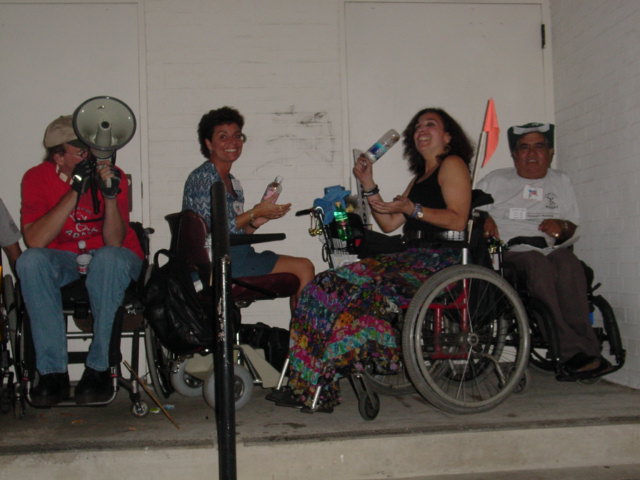 Nothing
is overlooked by the ADAPT warriors laying siege to a building. If there
are low windows we’ll park our wheelchairs in front of them to prevent
people from climbing out; if there are steps leading to a door, a few of
us in lightweight manual chairs will get carried up to the door. People
get very angry, at times, when they realize they can’t get out. They may
try to force their way out, yell obscenities at us from open windows, or
try the personal approach: “I have a disabled uncle, I understand your
plight so just let me out.” They very well may try climbing out of windows,
as the republicans did in October 2000 in DC when we surrounded their Headquarters
and spoiled the party they were having. The leaders advise us not to argue
with people. We just stare at them and chant: “Just like a nursing home,
you can’t get out!” and “We’re ADAPT, you’re trapped, get used to it!”
Nothing
is overlooked by the ADAPT warriors laying siege to a building. If there
are low windows we’ll park our wheelchairs in front of them to prevent
people from climbing out; if there are steps leading to a door, a few of
us in lightweight manual chairs will get carried up to the door. People
get very angry, at times, when they realize they can’t get out. They may
try to force their way out, yell obscenities at us from open windows, or
try the personal approach: “I have a disabled uncle, I understand your
plight so just let me out.” They very well may try climbing out of windows,
as the republicans did in October 2000 in DC when we surrounded their Headquarters
and spoiled the party they were having. The leaders advise us not to argue
with people. We just stare at them and chant: “Just like a nursing home,
you can’t get out!” and “We’re ADAPT, you’re trapped, get used to it!”
At
times the plan is not to surround the building but to get inside. Walking
people will rush to the doors, hold them wide open while we file in, through
every door at the same time as quickly as possible, confounding the security
guards… Till we fill the lobby, make it reverberate with the sound of 500
people chanting: “Our homes not nursing homes!” “Free our brothers, free
our sisters, free our people now!” Fourteen year-old Kyle might lead the
chant through his Liberator (communication device). Maybe a team will be
led to the elevator bank, we’ll push all the buttons and as the elevators
come down we’ll park our wheelchairs half-in half-out of each elevator
door… If there are people in the elevators as the doors open, we’ll savor
the shock on their faces first, then let them out. Maybe another team will
take the elevators to go upstairs and occupy someone’s office. “We’re here
for a meeting with the commissioner,” a day leader (maybe Barbara Toomer
from Salt Lake City or Linda Anthony from Harrisburg) will tell the dumbfounded
office worker who will sputter: “But…but you don’t have an appointment.”
The answer, of course, is always the same: “We don’t need appointments,
we’re ADAPT” and everyone starts chanting: “How do you spell power? A-D-A-P-T!!!”
It
can get pretty damn exciting! I’ve been doing ADAPT actions for the past
10 years, I’ve worked as color leader and day leader, and yet each time
I get as excited as I did on my first action. Now that I’m not as young
as I used to be, when I feel the adrenaline rushing through my veins, I
can’t even enjoy it. I have to worry whether the medication I took in the
morning will be enough to keep my quickly rising blood pressure from reaching
the dangerous level.
But
the excitement doesn’t stay at the dangerous level throughout the action
- thank goodness. As soon as things quiet down a bit (when the teams are
where they’re supposed to be, the building is secured, the offices are
occupied), the color leaders will go around to tell everyone exactly where
we are and why we’re here, and to read to us ADAPT’s list of demands. Color
leaders and day leaders will continue throughout the action to give updated
reports: “No response yet,” or “They’ve invited our negotiators in,” and
“They’re talking.” At times we’ll wait and wait and wait -- for hours --
for a response, for a meeting to be set up, or while the negotiating goes
on. The color leaders will do their best to keep the chanting going, or
they may come around with snacks or lunch. ADAPT pays no attention to fat
and cholesterol intake. The ADAPT lunch is typically: McDonalds hamburgers
and french fries. I’ll pass on it and get my banana and granola bar out
of my bag. After lunch we’ll chant again and wait…
You
know what? It can get pretty damn boring! But you know what else? Everyone
stays put. No one ever says: “I’m tired of waiting around, I’ll go for
a little stroll now.” Everyone knows how important everyone’s role is.
Of course, it may happen that someone feels ill or has to go to the bathroom
real bad. A color leader will get someone else to take his place so no
gaps are left. It may happen that one team is in the sun. Quadriplegics
and people with MS, who cannot sit in the sun for long, will go visit with
another team that’s in the shade and members of that team will take their
place.
ADAPT
actions are held in the Spring and in the Fall when the weather is most
mild. Of course, with the weather you never know. We’ve sweated in Memphis,
TN and in Washington, DC. We've sat in the rain in our ADAPT ponchos in
Lansing, MI and in Atlanta, GE. And we froze our butts in Columbus, OH.
It was 70 degrees the first day we were in Columbus (Fall ’99). The next
day we were thrown in the middle of winter – mean wind, wet snow falling.
Because of post-polio, I am extremely sensitive to the cold. And I was
totally unprepared - I had not thought of packing my winter coat. We sat
for three hours outside the Human Services Building (in order to get the
local ADAPT chapter to start meeting with their Medicaid Director), till
all my joints were stiff and aching, my teeth chattering. When the police
started arresting us, I saw the accessible school buses they had brought
to transport us to the police station and all I could think of was: “Those
school buses are well heated.” I must have said “thank you” to the policewoman
who pushed my chair to the bus at least ten times. I’ve never been so happy
to be arrested.
Over
200 of us were arrested during the Columbus action. Every effort is made
by ADAPT so that arrests are carried out in as orderly a manner as possible.
Color leaders know who on their team is willing to be arrested. They will
tell them where to position themselves. We’ll use handcuffs to chain our
wrists or the wheels of our chairs together to make it harder for the police
to move us. Right before arrests start, usually, color leaders will make
sure that people have not changed their minds, that those being arrested
for the first time are not too nervous, that all who are being arrested
have identification, and that they have any medication they need in the
original bottle.
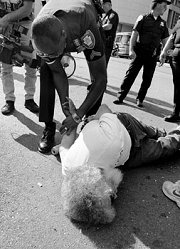 In
the early days of ADAPT, activists were roughed up badly by the police
while being arrested and after the arrest they often spent the night in
jail. Very rarely now does anyone get sent to jail. It did happen to John
Blevins from Rochester, NY. John is Deaf. He rushed to hold a door open
for people to file in to the AARP building during the Fall 2000 action
in DC. He did not hear the cop who had been trapped behind the door and
was yelling at John to let go. John was quickly thrown to the ground by
another cop and charged with assault. ADAPT’s lawyers got the charge dropped
but he did spend two nights in jail.
In
the early days of ADAPT, activists were roughed up badly by the police
while being arrested and after the arrest they often spent the night in
jail. Very rarely now does anyone get sent to jail. It did happen to John
Blevins from Rochester, NY. John is Deaf. He rushed to hold a door open
for people to file in to the AARP building during the Fall 2000 action
in DC. He did not hear the cop who had been trapped behind the door and
was yelling at John to let go. John was quickly thrown to the ground by
another cop and charged with assault. ADAPT’s lawyers got the charge dropped
but he did spend two nights in jail.
Usually
the worst charge pressed against us is “disorderly conduct.” We are booked
and then released. Later the lawyers will appear in court for us and settle
the matter. Even when things go very smoothly, though, the process takes
many hours. We always all wait around while everyone is questioned, photographed
and fingerprinted. ADAPT’s rule is: “we get arrested together, we leave
together.” We may not get back to the hotel till the middle of the night.
No matter what time it is, there is always a group waiting to welcome back
those who were arrested.
But
we don’t always get arrested. They didn’t arrest us in Memphis (May ’97)
and they have not arrested us in DC the last few times we were there. Sometimes
when they don’t arrest us they make things more difficult for us. In Memphis
about 100 people had occupied the Office of the Governor of TN, while the
rest of us filled the lobby and spilled outside and made a lot of noise.
When ADAPT demanded a meeting with the Governor, we expected one of two
things to happen: some form of dialogue to start (our negotiating team
was ready to go in) or the police to start arresting us. But we waited
and nothing happened. No word from the Gov’s office and no arrests. We
couldn’t just leave. So our people spent the night up in the governor’s
office while the rest of us held an all night vigil outside the building.
We sure got lots of media coverage in Memphis.
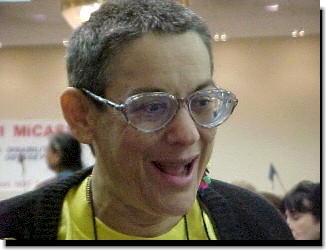 When
there are no arrests, Spitfire from Philadelphia is very disappointed.
She’s been arrested 48 times and is anxious to make that number a nice
round 50. She’s sure she’ll reach her goal at the action in Washington
DC (May 2001). We’re all sure. We’re expecting the worst from the new administration.
“Dubya will tell the DC police to throw us all in jail,” is the word going
around. But are we in for a surprise!
When
there are no arrests, Spitfire from Philadelphia is very disappointed.
She’s been arrested 48 times and is anxious to make that number a nice
round 50. She’s sure she’ll reach her goal at the action in Washington
DC (May 2001). We’re all sure. We’re expecting the worst from the new administration.
“Dubya will tell the DC police to throw us all in jail,” is the word going
around. But are we in for a surprise!
The
target for the first day’s action is the Department of Health and Human
Services (HHS). We surround the Humphrey Building (HHS headquarters) and
demand a meeting with Secretary Tommy Thompson. Through the Clinton years
ADAPT met regularly with HHS Secretary Donna Shalala and much was accomplished
through those meetings. Not wanting to lose its connection with HHS, ADAPT
had been trying to meet with Thompson since his appointment -but with no
success. 500 people at his doorstep make Thompson quickly come around.
Actually, Thompson is in Geneva, Switzerland. But from there he agrees
to meet with ADAPT.
Since,
when we get the written confirmation of the meeting with Thompson, it’s
still early enough in the day, we go on to pay a visit to our old foe,
the American Health Care Association (AHCA), which is the nursing home
owners’ professional organization. ADAPT demands that AHCA fund an ADAPT-written
“Notification of your rights under Olmstead” to be distributed to nursing
home and other institutional residents across the country. With 500 activists
surrounding the AHCA headquarters, ADAPT wins a meeting with President
and CEO Dr. Chip Rodman, to start working on the brochure. We return to
our hotel chanting: “How do you spell power? A-D-A-P-T!”
The
next day, demanding that within 30 days Bush issue an Executive Order to
implement Olmstead, ADAPT hits the White House. ADAPT activists have been
arrested chained to the White House fence a few times in the past. We’re
ready to be arrested at the White House fence again. But we have not even
been here an hour when 15 ADAPT representatives (and a sign language interpreter)
are invited into the White House for a meeting with John Bridgeland, Director
of the President’s Domestic Policy Council. I’m one of the fifteen. “No
problem,” Bridgeland assures us, “the Order will be out in 30 days, maybe
sooner.” Diane Schacht, Special Assistant to the President for Justice
Policy, then accompanies us out: “The Executive Order will be completed
and signed within 30 days,” she says, addressing the crowd. And the crowd
roars: “How do you spell power? A-D-A-P-T!”
The
third day brings yet another victory. ADAPT rolls up to the Housing and
Urban Development (HUD) Headquarters to demand a meeting with Secretary
Mel Martinez. Two previous attempts to set up a meeting had failed. ADAPT
activists quickly surround the building, blocking all doors. The 3-foot
high orange metal barricades and the scores of police officers in front
of the building do not stop us. A group of activists actually breaks through
the barricades, goes through the doors and into the building. That really
gets things moving. Our negotiating team is invited in and after about
an hour comes out accompanied by Daniel Murphy, the Secretary’s Chief of
Staff. He announces the meeting to the crowd that once again cheers: “How
do you spell power? A-D-A-P-T!”
Everyone
is triumphant. But there are a few who are wondering if ADAPT isn’t getting
too powerful. They’re starting to worry that, if this trend continues,
future actions might not be as exciting as they were in the past.
As
always, three days of actions end with a party. There’s music and dancing
way into the night, raffles and bargains at the ADAPT-ware tables. New
friends exchange addresses and phone numbers, old friends exchange gifts
and promises. There’s gossip going around: who fell in love with whom this
time? In the past we’ve had birthday celebrations. We all remember Spitfire’s
50th when the surprise gift was a male stripper. We’ve even
had a few ADAPT weddings and there are rumors there’ll be another wedding
at the next action in the Fall in San Francisco.
The morning after the hotel lobby is crowded with ADAPT activists lugging their suitcases, shower chairs, air mattresses and other equipment, waiting for their rides to the airport or to the train station. Everyone looks exhausted. A few might be hung over. We’ve all had little sleep, for four days we’ve survived on cold hamburgers and candy bars; we’ve really pushed ourselves to the limit. We’ll need a few days to recover when we get back home. But everyone is elated, exultant. Everyone is feeling powerful and proud. As we all hug each other, the refrain sounding off in every direction is not “Goodbye” but “See you at the next action!”